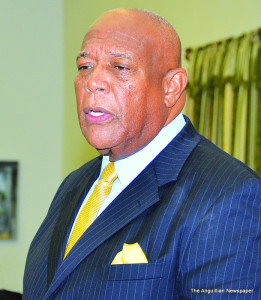
Ms. Palmavon Webster, Leader of the Opposition in the Anguilla House of Assembly, known for her persistence in seeking information regarding the state of affairs of the Anguilla National Bank and the Caribbean Commercial Banks, has been on the subject again.
On Tuesday, July 7, in the House of Assembly, she posed a question about the two indigenous banks to Chief Minister and Minister of Finance, Mr. Victor Banks, the soon-to-be Chairman of the Monetary Council of the Eastern Caribbean Central Bank. Her question and the Chief Minister’s reply are follows:
Question:
“Will the Chief Minister and Minister of Finance report to this Honorable House on the position being taken by the Eastern Caribbean Central Bank concerning Anguilla’s indigenous banks and will he inform this Honourable House what steps his Government proposes to take in relation to such banks to protect the best interests of Anguilla?”
Answer:
I thank the Leader of the Opposition for her question and I have noticed that as a Lawyer she is making sure that she is asking a question to which she already knows the answer.
I make this comment because it is ironic that before I was aware that the Leader of the Opposition was going to ask this question in the House of Assembly I had already invited her to my office to brief her on where we are in the process of resolving the Banking issue. That briefing took place on Friday in a very confidential environment and in the presence of my Deputy, the Honourable Member for Valley North — Mr. Evans McNiel Rogers.
Members of this Honourable House will be aware that this matter has been in process since August 13, 2013. The position of the ECCB on the indigenous banks was therefore articulated some twenty-months ago in its press statement that according to the ECCB Agreement of 1983, and with the approval of the Monetary Council (that included our former Chief Minister, the Hon. Hubert B. Hughes) the ECCB was exercising its powers under Part IIA, Article 5B of the Agreement, that is, to assume control of NBA and CCB as a prerequisite to carrying out a process of stabilization, restructuring and strengthening of these institutions.”
To effectively address these challenges, the ECCB brought together a consortium of creditable agencies that included the International Monetary Fund (IMF); the World Bank; the British and Canadian Government.
As we all know since that time there have been no published reports coming from the ECCB that would indicate that that process has changed.
In my State of the Nation Address on May 19, 2015 (less than a month after coming to office) I made this statement regarding the process that our Government would take:
“Since coming to Office the greater part of my attention has been spent in understanding this situation. This includes meetings with the Governor; the FCO; the ECCB; Senior Officials in the Ministry of Finance; my personal advisors; and talking to other interested parties and stakeholders.
Given the far-reaching consequences of not doing the right thing I must be very circumspect in treating with this issue. And while I fully understand the eagerness for information on this subject — one can run the risk of spreading misinformation in the process. Misinformation can be damaging to even the healthiest Bank.
I have informed the various players that for over eighteen months shareholders and customers have been kept out of the conversation. Anguillans have exhibited exceptional patience and tolerance. It is now time to allow them to have some input in the solution process. Such participation must be managed carefully with the proper protocols in place. We will find a way to ensure that such “restricted consultations” can happen.
But our Government’s responsibility is to find a solution that ensures the protection of the rights of all depositors and we are determined to achieve that even at a cost to Government. Secondly, our Government will only accept a solution that maintains local ownership in the indigenous banking sector. And finally, we must begin to discuss plans to strengthen the financial services sector as a whole bearing in mind that the world is watching how we handle these banks as well as their offshore subsidiaries.”
In the context, of the Leader of the Opposition’s question I would therefore like to emphasize that such “restricted consultations” as described above are now taking place — like what took place in my office with the Leader of the Opposition last Friday. These are steps towards selecting and implementing a solution that will protect the best interests of Anguilla and Anguillans.
When a viable solution has evolved from this process we anticipate that even more consultations and /or discussions will take place. We believe that over the next few weeks we may be in a position to give more definitive information.







